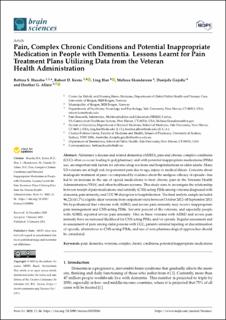| dc.contributor.author | Husebø, Bettina Elisabeth Franziska | |
| dc.contributor.author | Kerns, Robert D. | |
| dc.contributor.author | Han, Ling | |
| dc.contributor.author | Skanderson, Melissa | |
| dc.contributor.author | Gnjidic, Danijela | |
| dc.contributor.author | Allore, Heather G. | |
| dc.date.accessioned | 2022-02-07T13:28:05Z | |
| dc.date.available | 2022-02-07T13:28:05Z | |
| dc.date.created | 2022-01-17T13:55:09Z | |
| dc.date.issued | 2021 | |
| dc.identifier.issn | 2076-3425 | |
| dc.identifier.uri | https://hdl.handle.net/11250/2977534 | |
| dc.description.abstract | Alzheimer’s disease and related dementias (ADRD), pain and chronic complex conditions (CCC) often co-occur leading to polypharmacy and with potential inappropriate medications (PIMs) use, are important risk factors for adverse drug reactions and hospitalizations in older adults. Many US veterans are at high risk for persistent pain due to age, injury or medical illness. Concerns about inadequate treatment of pain—accompanied by evidence about the analgesic efficacy of opioids—has led to an increase in the use of opioid medications to treat chronic pain in the Veterans Health Administration (VHA) and other healthcare systems. This study aims to investigate the relationship between receipt of pain medications and centrally (CNS) acting PIMs among veterans diagnosed with dementia, pain intensity, and CCC 90-days prior to hospitalization. The final analytic sample included 96,224 (81.7%) eligible older veterans from outpatient visits between October 2012–30 September 2013. We hypothesized that veterans with ADRD, and severe pain intensity may receive inappropriate pain management and CNS-acting PIMs. Seventy percent of the veterans, and especially people with ADRD, reported severe pain intensity. One in three veterans with ADRD and severe pain intensity have an increased likelihood for CNS-acting PIMs, and/or opioids. Regular assessment and re-assessment of pain among older persons with CCC, patient-centered tapering or discontinuation of opioids, alternatives to CNS-acting PIMs, and use of non-pharmacological approaches should be considered. | en_US |
| dc.language.iso | eng | en_US |
| dc.publisher | MDPI | en_US |
| dc.rights | Navngivelse 4.0 Internasjonal | * |
| dc.rights.uri | http://creativecommons.org/licenses/by/4.0/deed.no | * |
| dc.title | Pain, Complex Chronic Conditions and Potential Inappropriate Medication in People with Dementia. Lessons Learnt for Pain Treatment Plans Utilizing Data from the Veteran Health Administration | en_US |
| dc.type | Journal article | en_US |
| dc.type | Peer reviewed | en_US |
| dc.description.version | publishedVersion | en_US |
| dc.rights.holder | Copyright 2021 by the authors. | en_US |
| dc.source.articlenumber | 86 | en_US |
| cristin.ispublished | true | |
| cristin.fulltext | original | |
| cristin.qualitycode | 1 | |
| dc.identifier.doi | 10.3390/brainsci11010086 | |
| dc.identifier.cristin | 1982614 | |
| dc.source.journal | Brain Sciences | en_US |
| dc.identifier.citation | Brain Sciences. 2021, 11 (1), 86. | en_US |
| dc.source.volume | 11 | en_US |
| dc.source.issue | 1 | en_US |

